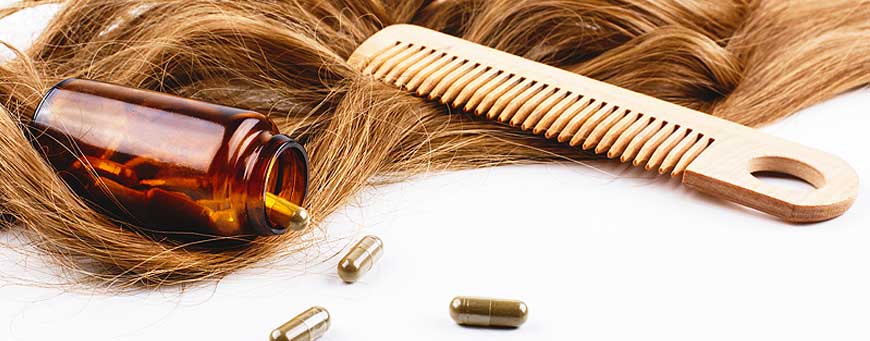You have no items in your shopping cart.

Are you looking for strong, beautiful hair? Many of us have been in search of the best hair supplements for growth to achieve this goal. But with so many choices on the market, it's hard to know which ones are worth the money.
That’s why we've put together this blog post - to help you find the best hair supplements that will help your hair grow and look its best! We'll go over some important things to look for in a supplement, as well as review some of the top products available today. So let's get started!
Why hair and nails supplements are important
Supplements are an important tool to consider if you are looking to achieve hair growth.. Taking the right hair and nails supplements can help provide your body with essential nutrients that might be missing from your diet, such as keratin, biotin, zinc, iron, vitamin C and omega-3 fatty acids. These vitamins and minerals play an important role in the health of your hair follicles, helping to prevent hair loss and promote hair growth.
The hair growth cycle
The hair growth cycle consists of three phases: the anagen phase, the catagen phase, and the telogen phase.
During the anagen phase, which is also known as the growth phase, new hair follicles are formed and old ones begin to grow.
The catagen phase is when the hair follicle gradually enters a resting stage and ceases active growth.
Finally, during the telogen phase, old hairs shed in order to make room for new hairs to come in.
Supplements that contain essential vitamins and nutrients can help support healthy hair growth by providing key nutrients to nourish the scalp and stimulate healthy follicle activity. Additionally, supplements containing biotin may help strengthen existing hairs for thicker volume.
List the best hair growth supplements, including ingredients, benefits, and side effects
Best vitamins for hair growth
When it comes to choosing the best supplements for growth, there are many options available on the market. But you want to make sure you include at least the options below.
Biotin supplements
Biotin is a B vitamin that is also called vitamin H. It is necessary for a group of enzymes to be able to break down some substances and turn on other enzymes that help the body make myelin.
Biotin is a vitamin that can be found in eggs, milk, and bananas, among other things. If you don't get enough biotin, your hair may thin and you may get a rash on your face.
However a lack of biotin is rare.
Keratin supplements
Keratin is an essential protein found in hair and nails that helps to give them their strength and structure. Keratin supplements have become increasingly popular in recent years as a way to naturally promote healthy hair and nail growth. These supplements can help to increase keratin production, which then helps to stimulate the growth of new, strong, healthy strands of hair. It also helps to strengthen existing hairs while fortifying nails and reducing breakage. The added keratin also works to replenish lost protein, making it easier for hair and nails to grow stronger and thicker than before.
Zinc
Studies have suggested that zinc can play an important role in promoting healthy hair growth. This essential mineral helps in the absorption of essential vitamins, such as vitamin A and E, which are essential for healthy hair production.
Zinc also helps to stimulate new cell development, promote follicle health, and increase blood circulation to the scalp. Furthermore, zinc helps to balance hormones and reduce stress levels - both of which can contribute to thinning hair.
For those looking for strong and healthy hair, it's always a good idea to look for supplements with zinc included on their list of ingredients!
Iron
Iron is a vital mineral for healthy hair growth. The body needs it to produce haemoglobin, which carries oxygen to the cells and helps them grow. Iron deficiency can cause hair to become thin, weak and brittle. Iron supplements can provide an extra boost of nutrition that helps strengthen existing strands while creating new ones. Studies have shown that taking a daily dose of iron can help reduce hair loss and promote faster and healthier growth. Many people find that taking an iron supplement not only improves their overall hair health but also adds fullness, volume, and shine to their locks.
In general, lack of iron also can cause fatigue, pale skin and lips, dizziness, shortness of breath, frequent colds and infections, dull hair and brittle nails. Iron deficiency can affect anyone regardless of age or gender and can cause long-term health problems if left untreated. To get enough iron, it's important to get the right balance of iron in your diet and to take iron supplements when necessary.
Omega fatty acids
Omega-3 and Omega-6 fatty acids, also known as essential fatty acids (EFA's) are important for healthy hair growth. These fatty acids help to nourish the scalp and hair follicles, encourage healthier cell production, and reduce inflammation. In addition, EFA's help to replenish lost moisture and add shine to the hair. Many products that claim to promote hair growth contain Omega-3 or Omega-6 fatty acids in their ingredients list. If you're looking for shinier hair, it may be worth considering incorporating some of these supplements into your daily routine!
Hydrolyzed collagen
Hydrolyzed collagen is a type of protein that can be taken as a supplement to promote thicker, healthier-looking hair.
Collagen helps to create keratin, which is an essential component of strong and healthy hair. Furthermore, this supplement can also lead to increased nail health and strength due to the presence of amino acids.
Hydrolyzed collagen has been found to help improve overall hair thickness and reduce split ends in some studies, making it an attractive option for those looking for stronger, healthier hair!
B vitamins
B vitamins play an important role in supporting healthy hair growth. Vitamin B complex, which is a combination of eight different B vitamins, helps the body convert food into energy and assists in cell renewal. This process is essential for collagen production, which is needed for strong and healthy hair. Additionally, vitamin B7 (biotin) has been found to be beneficial for preventing hair loss and promoting the growth of shiny new strands. Foods that are rich in B vitamins include fish, poultry, eggs, leafy greens, dairy products, legumes and nuts.
Other hair supplements
Hyaluronic acid
Hyaluronic acid is something that your body makes on its own, but it can also be made in a lab. As a humectant, it can hold on to water and hold about 1000 times its own weight in water.
Hyaluronic acid is used by rubbing onto the scalp and hair.
Take a pea-sized dose of HA serum after you get out of the shower. If you use too much serum, it could make your hair greasy and flat.
Use your fingertips to rub the product into your scalp for 5–10 minutes.
The rest of your hair can get a few more drops of serum. Use your hands to rub the product together and spread it evenly along the length of your hair.
Other beneficial ingredients
Other beneficial ingredients that can be found in hair supplements include saw palmetto extract, horsetail extract, green tea extract, and ginseng root powder.
Medical interventions for hair loss
Medical interventions for hair loss can range from oral medications to topical lotions.
Oral medications, such as finasteride, usually require a doctor’s prescription and are typically taken over the course of several months.
Topical treatments include lotions and creams that are applied directly to the scalp to help stimulate hair growth.
Hair transplantation is another medical intervention that can be used to restore hair in cases of extreme baldness or thinning. This procedure involves transferring follicles from one part of the scalp to another in order to promote new hair growth. In some cases, laser therapy may also be used to help stimulate new hair growth.
Finasteride (aka Proscar and Propecia) is a medication used to treat hair loss
Finasteride is a prescription drug commonly used for the treatment of male-pattern baldness.
It works by blocking the activity of an enzyme called 5-alpha reductase, which is responsible for converting testosterone into dihydrotestosterone (DHT).
By blocking this enzyme, Finasteride helps to prevent further hair loss and can even promote new hair growth in some cases.
The most common side effects of finasteride include decreased sex drive and erectile dysfunction. In rare cases, finasteride has also been linked to depression and other mental health issues. However, these risks typically go away when the drug is discontinued.
Side effects of using Finasteride are uncommon but you should consult a board certified dermatologist if you're concerned at all.
Minoxidil aka Regaine for male pattern baldness
Minoxidil is one of the few medicines that can actually regrow hair and make hair thicker.
It isn't to be taken lightly as it does have some side effects to be aware of. For example it can cause some hair shedding at the start, so it can make your hair seem worse in the very beginning, but stick with it because the hair will grow back and you'll notice increased hair thickness and stronger hair.
Minoxidil is the best hair growth medicine because it works by widening the blood vessels in the skin, allowing increased delivery of nutrients and oxygen to hair follicles. This helps support new hair growth, strengthening existing hairs.
When applied directly to the scalp, it can also increase blood circulation and encourage thicker, fuller hair growth in balding or thinning areas.
When the hair follicle gets smaller its' known as follicle miniaturisation. This can cause hair thinning and hair loss and Minoxidil helps reverse this by increasing the size of the follicle to increase hair growth.
Minoxidil is available as an over-the-counter topical solution or foam that should be applied twice daily for best results. I takes up to 2-4 months to see a noticeable difference
Why does Minoxidil cause hair shedding?
Minoxidil is a medication commonly used to treat hair loss, but it can also cause a shedding phase. This is because when Minoxidil is applied topically to the scalp, it triggers a process known as 'micro-inflammation,' which increases blood flow to the scalp and encourages the growth of new hairs.
Although this can be beneficial in helping people with thinning hair regain their lost volume and fullness, it can also lead to a period of temporary shedding as more hairs enter their growth cycle. In general, this side effect should subside after 2-3 months of consistent use.
Lifestyle choices
In addition to taking a supplement for growth, it is also important to maintain healthy hair with diet and lifestyle changes. Eating foods that are rich in nutrients such as fruits, vegetables, protein, and omega-3 fatty acids can provide all the vitamins essential for hair health. Additionally, limiting the use of hair styling products and avoiding excessive heat can help protect your hair from damage.
If you have concerns about taking a supplement or are unsure if it is right for you, it is important to speak with a doctor or nutritionist. They can provide advice on which supplements may be best for your individual needs as well as any potential side effects of the product.
Summary
To summarize, hair supplements for growth can be an effective tool for achieving thicker and longer locks over time. It is important to find a product with all-natural ingredients such as biotin, keratin, zinc, iron, and omega-3 fatty acids. When choosing a supplement, it is important to consider your individual needs as well as any potential side effects of the product. Additionally, maintaining healthy hair with diet and lifestyle changes can be beneficial for hair health. If you have concerns about taking a supplement, it is important to speak with a doctor or nutritionist before starting.

This information is intended solely for New Zealand residents and is of a general nature only. No person should act in reliance on any statement contained in the information provided, but at all times should obtain specific advice from a health professional.
